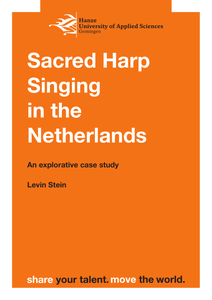This study employed an exploratory approach by applying practice theory to insights gathered throughthe triangulation of interview, document analysis and observation methodologies to 1) map the SacredHarp Singing practice scope and give a nuanced picture of its performativity in the Netherlands, witha particular focus on the Sacred Harp group from Amsterdam comparing it to one from Bremen and 2)investigate the underlying rise of transformative emotions, the social, secular, and religious meanings, andthe sense of belonging to an international community. The findings suggest that Sacred Harp enthusiastsin the region are keen on retaining the legacies of the traditional singers by establishing similar singingatmospheres and by following the practice’s historical customs and practices, including the communalsinging in the “hollow square” and the affinity towards democratic participation. The findings alsoindicate that while there is a noticeable level of commitment and excitement among local enthusiasts,the growth of the groups’ memberships is hampered by a lack of interest by the general public, possiblyin connection with insufficient strategies for publicizing the practice. Therefore, the existence of thesebarriers could imply that the practice would probably grow at a relatively slow pace in the region.
DOCUMENT

People with voice problems can seek advice and therapy from a speech-language pathologist. Besides having problems with the speaking voice, a number of them are also amateur choristers. In addition to her standard examination, the speech-language pathologist has to specifically describe the use of the singing voice during choral singing and to assess the amount of mutual influence of speaking and singing voice. In therapy, a healthy phonation is learned. In today's practice, the therapist tends to confine herself to training the sepaking voice. It is known that pitch variation influences phonation. As pitch is a complicating factor in singing, the therapist could make the client aware of this influence by using exercises that alternate speaking and singing voice. Reference to and cooperation with singing teachers is essential. A network of speech-language pathologists 'with an ear for singers' and singing teachers should be built up.
DOCUMENT
Sinds de invoering in 1998 van de Tweede Fase in het Middelbaar Onderwijs is er een nieuw elan geslopen in discussies die gaan over wat interdisciplinariteit in de kunsten precies betekent en hoe deze van betekenis kan zijn voor het kunstonderwijs. Tot het moment van invoering werd het kunstonderwijs op de middelbare school op een monodisciplinaire wijze vorm gegeven, maar met de invoering kwam het fenomeen interdisciplinariteit veel directer in de schijnwerpers van het onderwijs te staan. De vakken CKV 1 – 3 (Culturele en Kunstzinnige Vorming) hadden veel nadrukkelijker een gemeenschappelijke benadering van de kunsten als vertrekpunt en die benadering richtte zich heel direct op gemeenschappelijke kenmerken van de kunstdisciplines.
DOCUMENT

Met een consortium van muziekdocenten die zich gespecialiseerd hebben in ouderen en muziek voerde het lectoraat Lifelong Learning in Music van 2010-2012 onderzoek uit naar het leren bespelen van een instrument op oudere leeftijd. Maar hoe is het om voor het eerst een instrument te leren bespelen in de drukste levensfase in combinatie met kinderen en werk. Linda Hendriks leerde klarinet te spelen in deze levensfase en reflecteerde op de uitkomsten van eerder onderzoek naar muziekbeoefening door volwassenen en de rol van oefening daarbij. Zij relateert deze onderzoeksbevindingen aan haar eigen vertrekpunt en ervaringen. Ze gebruikt hierbij onder meer de uitkomsten van literatuuronderzoek uitgevoerd door Peter Mak naar de versnelling van het uitvoeringstempo voor oudere instrumentalisten, dat deel uitmaakte het lectoraatsonderzoek naar ouderen en muziek.
DOCUMENT

What is known in scientific literature at this point in time about the effects of the measures against the transmission of the coronavirus and what is the meaning of this for the organisers of events?
DOCUMENT

Wat is er op dit moment (medio augustus 2020) in de wetenschappelijke literatuur bekend over (de effecten van maatregelen tegen) de verspreiding van het coronavirus en wat is de betekenis daarvan voor organisatoren van evenementen?
DOCUMENT
